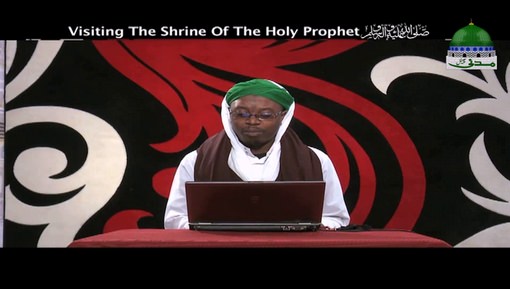
Two distinctive peculiarities of the Holy Prophet صَلَّی اللہُ عَلَیْہِ وَاٰلِہٖ وَسَلَّمَ
Prohibition of raising voice in the court of the Holy Prophet صَلَّی اللہُ عَلَیْہِ وَاٰلِہٖ وَسَلَّمَ
Raising voice in the court of the Beloved Prophet صَلَّی اللہُ عَلَیْہِ وَاٰلِہٖ وَسَلَّمَ has been declared Haraam. (Mawahib-ul-Ladunniyyah, vol. 2, pp. 286)
Allah Almighty has stated in the Holy Quran:
یٰۤاَیُّهَا الَّذِیْنَ اٰمَنُوْا لَا تَرْفَعُوْۤا اَصْوَاتَكُمْ فَوْقَ صَوْتِ النَّبِیِّ وَ لَا تَجْهَرُوْا لَهٗ بِالْقَوْلِ
كَجَهْرِ بَعْضِكُمْ لِبَعْضٍ اَنْ تَحْبَطَ اَعْمَالُكُمْ وَ اَنْتُمْ لَا تَشْعُرُوْنَ(۲)
O believers! Do not raise your voices higher than the voice of this Conveyor of the unseen (Prophet Muhammad), and nor speak aloud in his august court just like you speak aloud to one another amongst yourselves. In case your deeds go to waste whilst you are unaware.
[Kanz-ul-Iman (translation of Quran)](Part 26, Surah Hujurat, Ayah 2)
The acts of reverence of Sayyiduna Siddiq رَضِیَ اللہُ عَنْہُ and Sayyiduna Farooq رَضِیَ اللہُ عَنْہُ
Shaykhain-e-Kareemain, i.e. Sayyiduna Abu Bakr Siddiq and Sayyiduna Umar Farooq رَضِیَ اللہُ عَنْہُما had a unique state when this commandment was revealed by Allah Almighty, let’s read about it:
When this blessed Ayah was revealed, Sayyiduna Abu Bakr Siddiq رَضِیَ اللہُ عَنْہُ humbly said in the court of Holy Prophet صَلَّی اللہُ عَلَیْہِ وَاٰلِہٖ وَسَلَّمَ :
یٰۤاَیُّهَا الَّذِیْنَ اٰمَنُوْا لَا تَرْفَعُوْۤا اَصْوَاتَكُمْ فَوْقَ صَوْتِ النَّبِیِّ وَ لَا تَجْهَرُوْا لَهٗ بِالْقَوْلِ
Ya Rasoolullah! I swear to Allah! Now I will talk to you in whispers. (Kanz-ul-‘Ummal, vol. 1, pp. 214, part. 2, Hadees 4604)
After the revelation of this blessed Ayah, Sayyiduna Umar Farooq رَضِیَ اللہُ عَنْہُ would talk in a very low voice in the court of Holy Prophet صَلَّی اللہُ عَلَیْہِ وَاٰلِہٖ وَسَلَّمَ , even (sometimes) the Holy Prophet صَلَّی اللہُ عَلَیْہِ وَاٰلِہٖ وَسَلَّمَ would have to ask him again to comprehend (what do you say?). (Tirmizi, vol. 5, pp. 177, Hadees 3277; Sirat-ul-Jinaan, vol. 9, pp. 399)
Aa sakta hay kab ham say ganwaron ko adab woh
Jaysa kay adab kartay thay Yaaran-e-Muhammad
(Qabala-e-Bakhshish, pp. 71)
Raising voice near the blessed shrine of the Holy Prophet صَلَّی اللہُ عَلَیْہِ وَاٰلِہٖ وَسَلَّمَ
Dear Islamic brothers! No one should raise his voice near the blessed shrine of the Holy Prophet صَلَّی اللہُ عَلَیْہِ وَاٰلِہٖ وَسَلَّمَ . Sayyiduna Imam Maalik رَحْمَۃُ اللہِ عَلَیْہِ has said: اِنَّ حُرْمَتَهٗ مَيْتًا كَحُرْمَتِهٖ حَيَّا, ‘The respect and honour of the Holy Prophet صَلَّی اللہُ عَلَیْہِ وَاٰلِہٖ وَسَلَّمَ is absolutely same as it was during his apparent lifetime.’ (Al-Shifa, Part. 2, pp. 41)
Near the blessed shrine of the Holy Prophet صَلَّی اللہُ عَلَیْہِ وَاٰلِہٖ وَسَلَّمَ , when Ameer-ul-Mu’mineen (Sayyiduna) Umar رَضِیَ اللہُ عَنْہُ saw someone speaking in a loud voice, he رَضِیَ اللہُ عَنْہُ said: ‘Do you raise your voice above the voice of the Prophet?’ He then recited the same verse. (Fatawa Razawiyyah, vol. 15, pp. 169)
Sadr-ush-Shari’ah Mufti Amjad Ali A’zami رَحْمَۃُ اللہِ عَلَیْہِ has said: Offer Salaam in a moderate voice (before the golden grilles), neither loud nor harsh; otherwise because raising voice is his august court the deeds [of a person] will go to waste. (Bahar-e-Shari’at, vol. 1, pp. 1225)
Bargah-e-naaz me aahistah bol
Ho na sab kuch raaigan, aahistah chal
Salat and Salam as an obligatory act
It is obligatory for us to recite Salat and Salaam upon the Holy Prophet صَلَّی اللہُ عَلَیْہِ وَاٰلِہٖ وَسَلَّمَ . (Mawahib-ul-Ladunniyyah, vol. 2, pp. 276)
Allah Almighty has said:
اِنَّ اللّٰهَ وَ مَلٰٓىٕكَتَهٗ یُصَلُّوْنَ عَلَى النَّبِیِّؕ-یٰۤاَیُّهَا الَّذِیْنَ اٰمَنُوْا صَلُّوْا عَلَیْهِ وَ سَلِّمُوْا تَسْلِیْمًا(۵۶)
Indeed Allah and His angels send blessings on the Conveyor of the unseen (Prophet). O Believers! (You too) send blessings and abundant salutations upon him.
[Kanz-ul-Iman (translation of Quran)](Part 22, Surah Al-Ahzaab, Ayah 56)
Inhayn kis kay Durood ki parwa
Bhajay jab in ka kirdigar Durood
(Zauq-e-Na’t, pp. 125)
صَلُّوْا عَلَي الْحَبِيب! صَلَّي اللّٰه عَلٰي مُحَمَّد
Blessed Salat upon Prophet, Fard or Wajib?
O devotees of Rasool! It is a Fard act for every Muslim to recite Salat upon the Holy Prophet صَلَّی اللہُ عَلَیْہِ وَاٰلِہٖ وَسَلَّمَ at least once in a lifetime.
٭ As per the opinions of some honourable Islamic scholars: ‘In separate gatherings, when each time the blessed name of the Holy Prophet صَلَّی اللہُ عَلَیْہِ وَاٰلِہٖ وَسَلَّمَ is spoken or heard, it is Wajib to recite Salat upon him each time.’
٭ As per the opinions of some honourable Islamic scholars: In one gathering, when the blessed name of the Holy Prophet صَلَّی اللہُ عَلَیْہِ وَاٰلِہٖ وَسَلَّمَ is spoken or heard few times, it is Wajib to recite Salat upon him each time.’
٭ As per the opinions of some honourable Islamic scholars: It is Wajib to recite Durood once and reciting Salat upon him each time is a Mustahab (preferable) act. (Fatawa Razawiyyah, vol. 10, pp. 801, vol. 6, pp. 223; summarised)
In order to know more about the virtues and blessings of reciting Salat and Salaam and the disadvantages of not reciting it, read the booklet ‘Faizan-e-Durood-o-Salam’ written by Ameer-e-Ahl-e-Sunnat دَامَـتْ بَـرَكَـاتُـهُـمُ الْـعَـالِـيَـهْ. May Allah grant us Taufeeq to recite Salat and Salaam in abundance.
اٰمِيۡن بِجَاهِ النَّبِيِّ الۡاَمِيۡن صَلَّى اللّٰهُ عَلَيۡهِ وَاٰلِهٖ وَسَلَّم
Baithtay uthtay jagtay sotay
Ho Ilahi mira shi’ar Durood
(Zauq-e-Na’t, pp. 124)
صَلُّوْا عَلَي الْحَبِيب! صَلَّي اللّٰه عَلٰي مُحَمَّد
















Comments